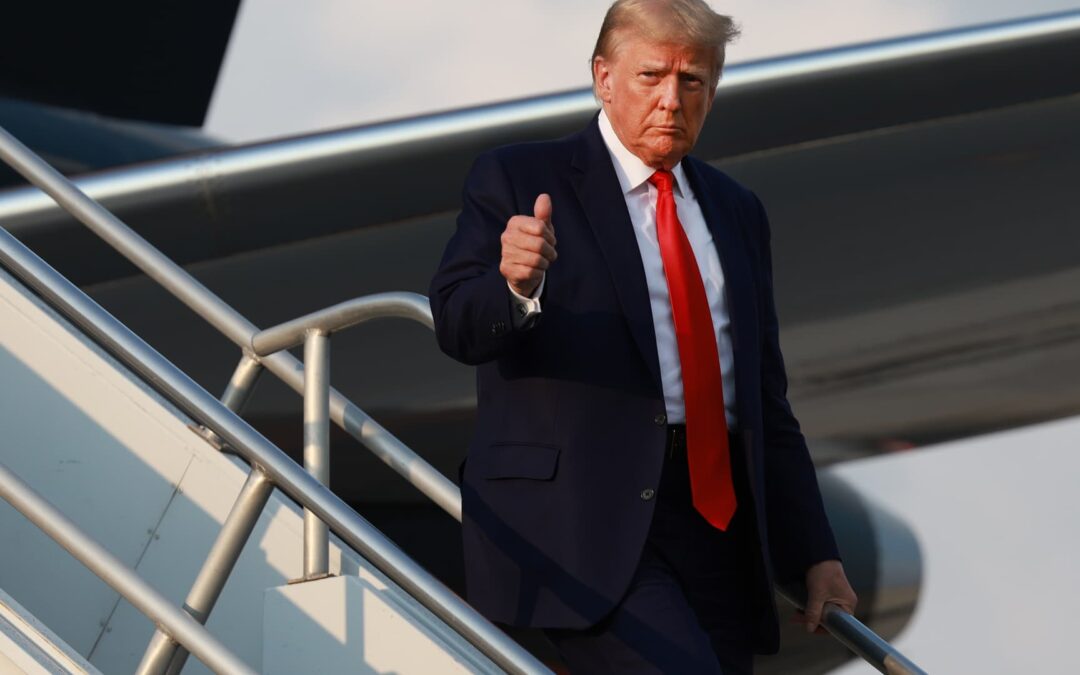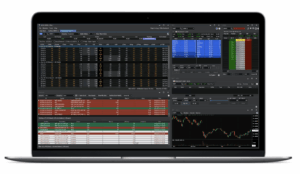Donald Trump is headed into autumn facing an astonishing number of scheduled criminal and civil trials — six, with the distinct possibility of a seventh — within the next nine months as he seeks the Republican presidential nomination.
One of those cases, a civil trial in New York, threatens to cripple the former president’s company, the Trump Organization.
Other trials in criminal court, where he is charged with 91 felony counts, put him at risk of being sentenced to prison even before the GOP National Convention in mid-July in Milwaukee.
The trials are taking place across three states and the District of Columbia — sometimes within days of each other, and sometimes with the same lawyers involved.
Trump has said he is innocent or not at fault in all of the cases.
In a social media post on Tuesday, he wrote: “These Indictments and lawsuits are all part of my political opponents campaign plan.”
“It is Election Interference, and they are going to use the DOJ/FBI to help them, which is illegal,” Trump wrote in his Truth Social post. “Crooked Joe pushed this litigation hard to get it done. This is a new low in Presidential Politics. To the Democrats, I say, ‘be careful what you wish for.’ “
Here’s the latest on where Trump’s legal threats stand:
New York Attorney General’s fraud lawsuit: Trial set to begin Oct. 2 in Manhattan Supreme Court
New York Attorney General Letitia James is suing Trump, the Trump Organization, and his sons, Donald Trump Jr. and Eric Trump, alleging years of widespread fraud involving false financial statements related to the company’s business.
James is seeking $250 million in damages in the civil case. She is also seeking to bar the Trump men individually from serving as officers of a company in New York and to bar the defendant corporate entities from doing business in the state.
The attorney general alleges that Trump “falsely inflated his net worth by billions of dollars.”
James claims he did so to get more favorable loan and insurance terms for the Trump Organization, and to lower the company’s tax liability.
Georgia election case: Trial of co-defendant Kenneth Chesebro set to begin Oct. 23 in Atlanta state court
Trump is charged with 13 felonies related to an alleged conspiracy to illegally interfere with Georgia’s 2020 presidential election and reverse his loss in it to President Joe Biden.
Eighteen other people also were indicted in the case in Fulton County Superior Court, among them Trump’s White House chief of staff Mark Meadows, and his former personal lawyer Rudy Giuliani.
Fulton County District Attorney Fani Willis has asked a judge to set a March 4 trial date for Trump, who among other things is charged with violating the state’s Racketeering Influenced and Corrupt Organizations Act.
That date is likely off the table, given the fact that Trump’s trial for a similar federal case on Monday was set for the same date that Willis is seeking.
But a Fulton County judge could still end up soon scheduling Trump’s trial in the Georgia case before the Republican convention and amid the GOP primary season.
In the meantime, one of Trump’s 18 co-defendants in the case, the lawyer Kenneth Chesebro, has been granted an Oct. 23 trial date after demanding a speedy trial.
The attorney Sidney Powell, another defendant, likewise has requested a speedy trial.
Trump faces the possibility of a minimum prison sentence of five years or more if convicted in the Georgia case.
E. Jean Carroll rape defamation lawsuit: U.S. District Court in Manhattan, Jan. 15 trial start
Trump is accused of defaming the writer E. Jean Carroll in 2019, when he was president, and then again in May, when he made statements about her when he denied her allegation that he raped her in a Manhattan department store in the mid-1990s.
In May, Carroll won $5 million in damages from Trump when a jury in the same court for another related civil lawsuit found that he had sexually abused her in the incident, and defamed her in statements last fall.
Trump in recent weeks has suffered multiple setbacks in the case now headed for trial.
District Judge Lewis Kaplan earlier this month dismissed Trump’s defamation counterclaim against Carroll.
In July, the U.S. Department of Justice dropped a nearly three-year effort to protect Trump from civil liability in the suit.
The trial is due to start the same day as Iowa holds its presidential caucuses.
New York pyramid scheme lawsuit: U.S. District Court in Manhattan, Jan. 29 trial start
Trump and the Trump Organization, in this civil class-action case, are accused of making millions of dollars in secret payments by conning working-class Americans to invest in an allegedly fraudulent multi-level marketing company called American Communications Network from 2005 through 2015.
Trump allegedly told prospective investors that “ACN’s flagship videophone was doing ‘half-a-billion dollars worth of sales a year,” and that he had “experienced the opportunity” and “done a lot of research.”
“None of this was true,” according to the suit.
Roberta Kaplan, one of the lawyers suing Trump on behalf of four anonymous plaintiffs, is also the lead attorney for Carroll in her suits.
In May, three of Trump’s children, Donald Trump Jr., Eric Trump, and Ivanka Trump, were dismissed as defendants from the case after Kaplan proposed that move.
Kaplan, at the time, said that the children’s prior depositions in the suit “made clear that Donald J. Trump himself was the architect, principal actor and largest beneficiary of the fraudulent scheme to endorse and promote ACN in exchange for secret payments.”
Federal election criminal case: U.S. District Court in Washington, D.C., March 4 trial start
Trump, early this month, was indicted on charges of illegally conspiring to overturn his loss to Biden in the national 2020 election.
Special counsel Jack Smith alleges Trump and unindicted co-conspirators sought to subvert democracy in multiple ways, including by trying to impede Congress from certifying Biden’s election on Jan. 6, 2021.
Some legal experts have said that this case, the second federal criminal prosecution filed by Smith, poses the greatest threat to the former president.
As they have done in Trump’s other cases, the former president’s defense attorneys tried to push the federal election interference trial past the 2024 election – in this case, all the way to April 2026.
Judge Tanya Chutkan on Monday rejected that effort, instead scheduling the trial to begin March 4, a day before Super Tuesday, the biggest day of the presidential primary season.
The most serious felony in the case carries a maximum possible prison term of 20 years, although he likely would receive a lesser punishment if convicted.
Trump business records, porn star hush money criminal case: Manhattan Supreme Court, March 25 trial
A New York state grand jury made history this March when it voted to return the first-ever criminal charges against a U.S. president, current or former.
Trump is accused in the case of 34 counts of falsifying business records as part of an alleged scheme to pay hush money in 2016 to porn star Stormy Daniels and Playboy model Karen McDougal to keep them quiet about their claimed sexual liaisons with Trump.
The payments were made shortly before the 2016 presidential election, in which Trump defeated Democratic nominee Hillary Clinton.
Trump’s former personal lawyer Michael Cohen, who pleaded guilty in federal court to facilitating both payments, is a key witness in the case against him.
The case, which is being prosecuted by Manhattan District Attorney Alvin Bragg’s office, largely centers on the money Cohen was reimbursed by Trump and his company for paying Daniels $130,000.
Trump’s attorneys last month lost a bid to move the case to federal court.
Earlier this month, Kaplan, the federal judge in Carroll’s case, ruled that Bragg could be given Trump’s deposition from the civil case, raising the prospect that Trump’s own words will be used against him in the criminal case.
Classified documents criminal case: U.S. District Court in Fort Pierce, Florida, May 20 trial start
Trump is charged with retaining hundreds of classified documents at his Palm Beach club Mar-a-Lago after he left the White House in early 2021, and trying to hide those records from government officials seeking their return.
Most of the 40 felony counts in the case — which is also being prosecuted by special counsel Smith’s office — relate to Trump’s alleged hoarding of national defense information
But he also was charged with an attempt to delete security footage from the club after it was subpoenaed last summer.
Two co-defendants in the case — Walt Nauta, Trump’s personal valet, and Mar-a-Lago maintenance worker Carlos De Oliveira — likewise are charged with conspiring to erase that footage.
That footage allegedly shows Nauta and De Oliveira moving around boxes containing classified documents.
The trial is set to begin two months before the Republican National Committee will select the next 2024 GOP presidential nominee.
The top charge in the case carries a maximum possible prison sentence of 20 years.








